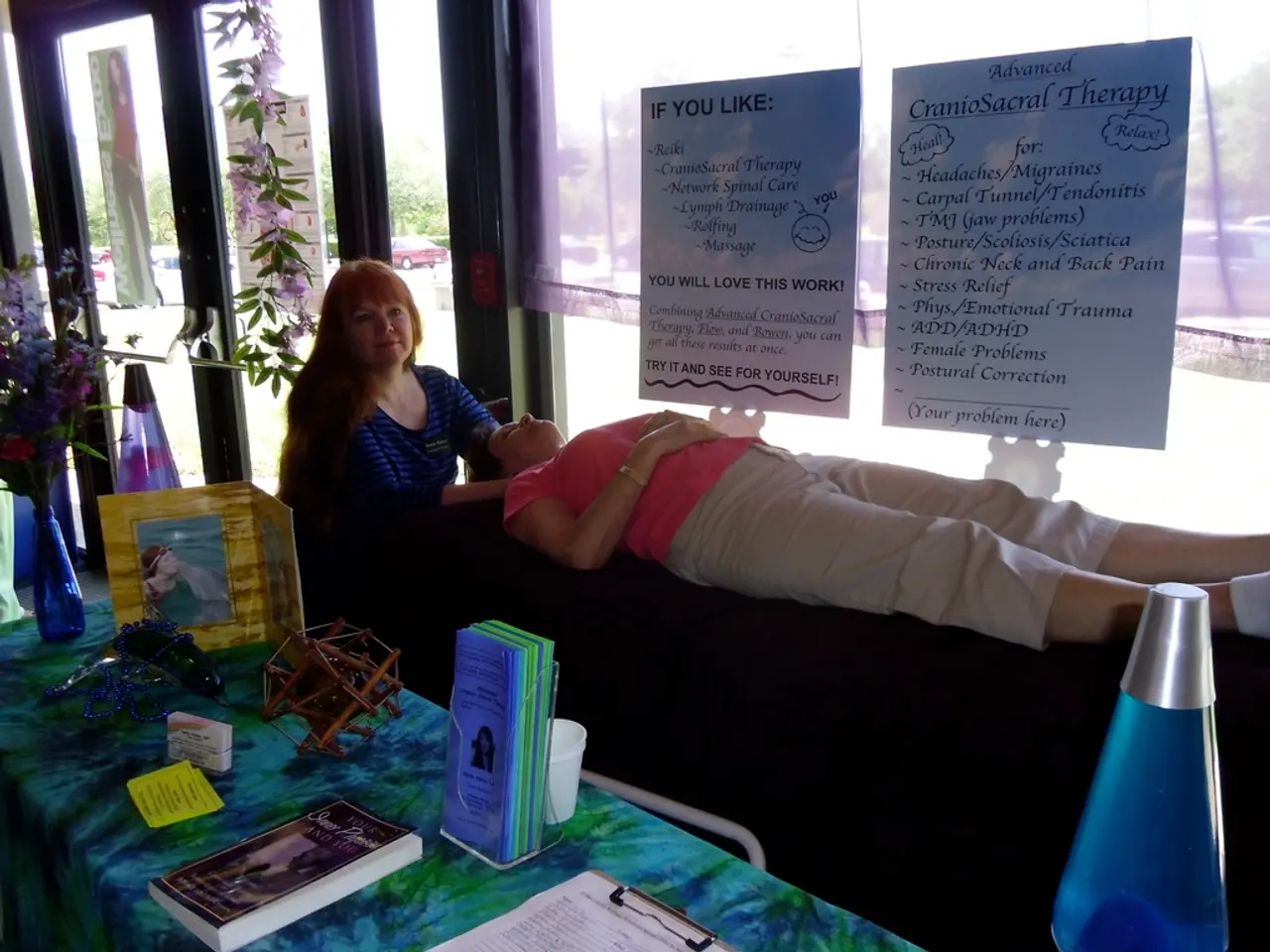Differences and Treatments for Anxiety and Depression: A Comprehensive Overview
Managing Anxiety and Depression: Strategies and Treatments
Anxiety and depression are two distinct but related mental health conditions that can significantly impact a person's life. While anxiety causes excessive worry and physical tension, depression involves persistent feelings of sadness and hopelessness.
Understanding the Symptoms
Anxiety typically brings racing thoughts, physical symptoms like a tight chest and knotted stomach, and restlessness. People with anxiety may have difficulty sleeping due to overactive thoughts and feel agitated yet unfocused [1][2]. On the other hand, depression often leads to feelings of emptiness or hopelessness, low motivation, and heavy fatigue that sleep does not relieve. It often causes disinterest in activities once enjoyed and can lead to changes in sleep patterns (too much or too little) [1][5].
Identifying the Causes
Anxiety can stem from genetics, brain chemistry, personality, and life events causing chronic worry or panic attacks. Panic attacks are intense episodes of fear that occur suddenly and include symptoms such as shortness of breath and dizziness [2][3]. Depression may have biological, psychological, and environmental causes. It can be triggered by traumatic or stressful events (situational depression) or occur without clear triggers in major clinical depression [5].
Seeking Help and Treatment
Treating anxiety and depression requires a combination of lifestyle changes, therapy, and sometimes medication. Cognitive-behavioral therapy (CBT) is effective for both conditions, helping to reframe negative thought patterns [2][3]. For anxiety, exposure therapy is particularly useful, especially for panic disorder [2][3].
Depression treatments include psychotherapy, antidepressant medications, lifestyle changes, and sometimes combined approaches. Situational depression may improve over time but clinical depression often requires ongoing treatment to prevent severe consequences [5].
Coping Strategies
For anxiety, coping methods include mindfulness, relaxation techniques, acceptance skills, grounding exercises, and structured problem-solving to manage worry cycles [3]. For depression, coping can involve regular physical activity, establishing routines, engaging in pleasurable activities, mindfulness, and social support to reduce symptoms and improve mood [4].
Lifestyle Changes
A balanced diet rich in omega-3 fatty acids, vitamins, and minerals supports brain health. Regular exercise releases endorphins, which improve mood and reduce stress. However, it's important to avoid extreme caffeine consumption, as it can worsen symptoms of anxiety and depression [6].
Professional Support
Encouraging professional help, being a non-judgmental listener, participating in health-focused joint activities, showing understanding, and performing regular check-ins can also help someone struggling with anxiety or depression [7]. It's crucial to consult a healthcare professional before starting any medication.
Addressing Stressors
Prolonged exposure to stressful situations can lead to the development of anxiety or depression. Key stressors include work-related stress, relationship problems, and financial difficulties [8]. Meditation and deep breathing help regulate stress levels, while progressive muscle relaxation reduces physical symptoms of anxiety [9].
Prevention and Recovery
Untreated symptoms of anxiety and depression will generally deteriorate with time. Interpersonal Therapy focuses on improving relationships and communication skills, which are crucial for emotional well-being. Humans need strong personal connections to maintain emotional health, and a lack of supportive relationships can increase anxiety and depression [10].
Overall, seeking appropriate approaches through lifestyle changes, therapy, stress management techniques, and professional support is essential for recovery. Both anxiety and depression are valid medical conditions requiring appropriate care tailored to symptoms and underlying causes [1].
- Exercise, such as running or yoga, can help improve mood and reduce stress, offering a coping strategy for managing anxiety.
- Meditation and deep breathing exercises are effective stress reduction techniques, assisting in dealing with mental health challenges like anxiety and depression.
- A balanced diet inclusive of nutrition-rich foods like those containing omega-3 fatty acids, vitamins, and minerals supports overall health and mental health.
- Mindfulness, relaxation techniques, and structured problem-solving are useful for managing anxiety symptoms and worry cycles.
- Cognitive-behavioral therapy (CBT) can be effective in addressing negative thought patterns connected to anxiety and depression.
- In some cases, medication may be necessary in addition to lifestyle changes and therapy for treating anxiety and depression.
- Encouraging professional help, showing understanding, and participating in joint activities can offer valuable support to someone struggling with mental health conditions.
- Addressing key stressors like work-related stress, financial troubles, or relationship problems can help prevent the development of anxiety and depression.
- Treating anxiety involves strategies like exposure therapy, especially for panic disorder, to help retrain the brain and reduce anxious responses.
- Recovery from anxiety and depression is facilitated through the use of interpersonal therapy, focusing on communication skills and strengthening personal relationships.
- Skin-care routines, workplace-wellness programs, and therapies and treatments like medicated creams, medicare options, and CBD products can contribute to overall health-and-wellness and mental-health strategies.




